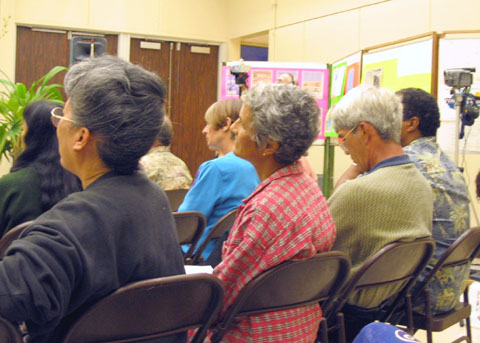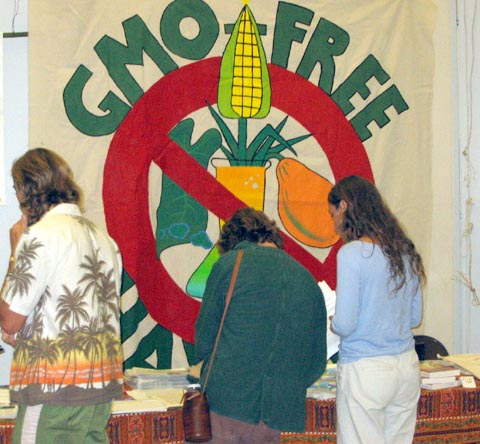SUBJECT: GMO-FREE KAUAI EVENT
SOURCE: JUDY DALTON dalton@aloha.net
POSTED: 7 FEBRUARY 2005 - 8:30am HST
GMO Legislative Action Alert!

detail of logo of GMO Free Kauai organization
by Judy Dalton 7 February 2005 For other environmental legislative alerts, sign up with Sierra Club at: mikulina@lava.net Welcome, Friends, to GMO Free Hawaii's State Action listserve. GMO-Free Hawaii is a coalition of all the island groups working to move Hawaiian agriculture away from genetic engineering. We now have active groups on all the major Hawaiian islands. This is a new listserve to help mobilize those of us across the state who want to help create a GMO-free Hawaii. Somewhere along the way, you signed our petition, gave us your e-mail, or said you supported our efforts to protect Hawaii and its people from genetic engineering. This listserve is a way to network the thousands of people who have signed up to support this movement across Hawaii; we will send out periodic action alerts to mobilize all the members of our coalition so we can use our numbers to help create real change on this issue. We understand that you probably already receive a lot of e-mail, but we will limit what we send you to a few critical action alerts, particularly in the realm of legislation where your written testimony has the power to make a difference. The bulk of your help is needed during Hawaii's short Legislative session, from now through the beginning of April, during which time we will be sending you an alert about once a week. We have the potential to use our power as Hawaii's citizens to get our representatives to truly represent us on this issue. With your help, the legislature will know how many people are behind these bills and they will be influenced to vote accordingly. We often are only given 24 or 48 hours notice before testimony is due, so it is important that you send testimony as quickly as possible. Thank you for caring about your future and the future of Hawaii and taking the time to make a difference. Below
is your first action alert:
If you live
in their district, please be sure to tell them that as well. If
you have more time; here's
the contact list for the rest of the committee members. Calling
them will increase the chances of getting a hearing scheduled. If
you live in one of their districts, please be sure to tell them
that you live in their district. Your voice has more power. BACKGROUND This bill
This bill
To receive future alerts send a blank e-mail to If you would not like to receive these very important
action notices, please send a blank e-mail to |
SUBJECT: GMO-FREE KAUAI EVENT
Scientific & Cultural Arguments Against GMO's Presented
SOURCE: JUAN WILSON
juanwilson@mac.com
31 January 2005 - 8:30pm

Report
on GMO-Free Kauai Presentation
The meeting was held on 25 January 2005 in Lihue and was well attended. There were elements of a Hawaiian culture in the tone and details of the evenings events. There was a traditional blessing to open the meeting. Hawaiian music filled the air and there was a potluck luau before the speakers took the stage. There were five speakers. Each made a 15 minute presentation on genetically modified organisms (GMO's) before questions were taken from the audience. Please forgive the spottiness of this report. It was difficult for me to take notes fast enough or accurately enough to catch the volume of material presented, but here is what I was able to catch. The
Culture of Taro Each fable had a moral that focused on the cultural importance of karo and the wisdom of traditional Hawaiian methods that proved to be healthy and sustainable. The morals included: • treating
karo with the respect of an older sibling State
Seizes GMO as Solution to Problems The rural areas of the state want to stay the way they are. The UH program is trying to help farmers with a technology that is free of pesticides and chemicals and achieve real self sufficiency in farming. In the 1990's the agriculture in the state was changed by shifts in the economy that has generated changes in agland usage away from cane production. As a result the State and UH became strong advocates of GMO technology. UH began a program to work on genetically engineered (GE)coffee, tobacco, papaya and taro. A commercially distributed GE papaya is now on the market. Mr Venezuela has asked to see data on safety tests for crops developed in open field experiments and has received nothing. Hawaii has become the center for GMO experiments and it is not known what is being tested in open fields. Worldwide GMO experiments have included attempts to bring arctic fish genes to tomatoes (to keep them safe in an frost) and putting spider genes in a goat (so it's milk will produce silk). No one knows what the effect of these "frankenstein" experiments will lead. There are about 4500 test sites in Hawaii. Unknown tests are done in small plots, in secret locations. There are biopharmaceutical tests being done. It has been demonstrated that GMO papaya has contaminated crops throughout Hawaii (with the possible exception of Kauai). Some countries, like Japan, do not accept GMO products. This will hurt Hawaiian agriculture. Labeling is needed for GMO products. Mr Venezuela said that because of GMO's, less resources are being spent on organic and sustainable farming by the State of Hawaii. We
Don't Know the Effects of GMO's As a result the GMO corporations are taking risks with our lives. They are creating living beings that can reproduce and mutate. If proved dangerous, a laboratory produced pharmaceutical, like Vioxx, can cease production and be recalled. The GMO experiment maybe impossible to recall once it escapes or mutates. It can affect other living organisms. It is alive. With drugs, unless we know their effects and safety, we do not release them. An approved drug must be proven safe and effective.These precautionary principles of health science should be applied to GMO experimentation. We do not know the adverse effects of GMO's. The FDA and other regulatory agencies are now depending on GMO and pharmaceutical company money to pay their scientists to get and interpret data. As a result they are caught in a conflict of interest. The precautionary principal should include conflict of interest. Kanaka
Maoli need to know about GMO's Patents are now being extended to living organisms. This was not the intent of patent law. This misuse of patent law will hurt small farmers to enrich patent holders. In a way, the GMO technology can be seen as a kind of 21st century colonialism. As part of that colonialism, the big corporations are doing "bio-prospecting". Bio-prospecting is the gathering of the traditional knowledge of local people for profit. There is currently bio-prospecting of kanaka maoli knowledge. Pharmaceutical companies are seeking repository if bio-diversity knowledge in Hawaii. As an example, Diversa Corporation has been given a deal to transfer their UH bio-technology information. Western intellectual property law may assert the right to own the knowledge our ancestors. This goes against the traditions of Hawaiian's not to "dry out the bones of their ancestors". ProdiGene, HiBred, Syngenta, DOW and Monsanto are interested in several Hawaiian agricultural products for experimentation, that include taro, pineapple and sugarcane. Bio-Pharming is going on. There are experiments to see if corn can produce blood clotting agents. Hawaii is a target
of GMO experimentation for several reasons. The Hawaiian community should realize that GMO business is colonialism and that Hawaii has become a GMO Sacrifice Zone. The Theft
of Life: Te Raweka Ira In New Zealand people are eating Genetically Enginered (GE) foods and do not know it. There is no labeling. It is a high priority of the government to develop bio-technology. There has been a concerted effort at co-optation of the Maori knowledge and their rights. In tribal New Zealand a Maori inadvertently signed a release to allow human gene experiments in sheep to be conducted in Maori traditional areas. The New Zealand government does not consider cloned animals to be genetically modified. There has also been a co-optation of Maori legends and lore to support GMO technology. For example, Maori have been told their prayers can make them safe from adverse affects of GMO experiments and that genes do not have traditional Maori "life force" and therefore are harmless. The decision to move forward with GMO's should include a test • for the
sacredness of something ( tapu ) Strategies
for Change We will need a grassroots effort to • monitor
the research
for more information contact: www.gmofreekauai.org
|
SUBJECT: COME TO GMO-FREE KAUAI EVENT (FREE!) JAN 25
There will be live music and pupus too!
SOURCE: JUDY DALTON
dalton@aloha.net
20 January 2005 - 1:30pm
We encourage you
to attend this up-coming community event. There will be pupus and
live music from 5:30-6:30. Then the presentation will begin at 6:30.
The event is free and all members of the community are invited to
attend. www.higean.org
www.gmofreekauai.org
|
Pau


